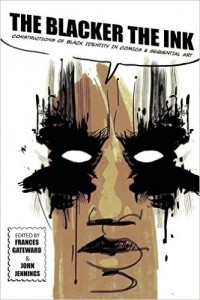CSUN Prof’s Book on Blacks’ Portrayal in Comics Wins Eisner Award at Comic-Con
 “The Blacker the Ink,” an anthology that explores black identity on the comic pages and in comic books and graphic novels, and co-edited by California State University, Northridge professor Frances Gateward, won a Will Eisner Comic Industry Award at Comic-Con San Diego 2016.
“The Blacker the Ink,” an anthology that explores black identity on the comic pages and in comic books and graphic novels, and co-edited by California State University, Northridge professor Frances Gateward, won a Will Eisner Comic Industry Award at Comic-Con San Diego 2016.
Named for acclaimed comics creator Will Eisner, the awards, sometimes called “the Oscars of comics,” are given by Comic-Con International to highlight the best publications and creators in comics and graphic novels. “The Blacker the Ink: Constructions of Black Identity in Comics and Sequential Art” was named best academic or scholarly work at last week’s gathering.
“We were shocked when they called our names,” said Gateward, an associate professor in CSUN’s Department of Cinema and Television Arts who heads the media theory and criticism option and co-edited the anthology with John Jennings. “It’s nice to have your work validated. The validation means a great deal coming from a group outside academia. It means that people in the comic industry read our book and the topics and issues it covered. Hopefully, they’ll take some of it to heart.”
Gateward said the Eisner Awards ceremony was similar to the Academy Awards. Actor John Barrowman, who appears in the TV series “Arrow,” served as host, and various comic writers introduced each award while images of the nominees were shown on a large screen.
“Given the other nominated books, I truly expected not to win, so when they called our names, John and I looked at each other with astonishment,” Gateward said. “When they escorted us backstage after we accepted the award, we were still in shock.”
Gateward called the win “bittersweet,” coming on the heels of the unexpected death this spring of one of the contributors to the book, Consuela Francis, who wrote the essay “Blackness and the American Superhero.” Francis was professor of English and chair of African-American studies at the College of Charleston in South Carolina.
The 15 essays in “The Blacker the Ink,” written by academics, explore a gamut of sequential art — from the early days of newspaper comic pages to graphic novels — with subjects such as race and science fiction, gender construction, colonialism and African-American history.
Gateward said comics always have been an important part of popular culture, serving as a way to illustrate or comment on contemporary society. How people are portrayed, however, depends on who controls the publication.
The emergence of African-American newspapers in the early 20th century, she said, offered an alternative portrayal of African-American life to those found in stereotype-riddled images in more mainstream publications.
“The people in power wanted to define what blackness was, rather than let black people define themselves,” she said.
As African-American artists began to publish independently — and to find jobs at Marvel and DC Comics — they began to tell their own stories in the comic pages and graphic novels.
“Stories of who we are and what we are capable of began to change,” Gateward said.

 experience
experience